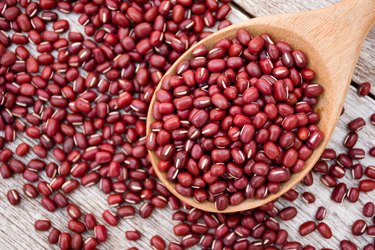
Black grapes are a delicious, nutritious fruit, popularly eaten plain and in products like preserves, juice and wine. Whether you want to eat them by the handful or add them to a recipe, here's everything you need to know about black grapes' nutrition and the many health benefits of the tasty fruit.
Black Grapes' Nutrition Facts
Video of the Day
If you're looking for a convenient snack right out of the fridge or want to create a natural dessert, these grapes serve up satisfaction in both taste and nutrition — indeed, black grapes are good for you.
Video of the Day
According to the USDA Nutrition Database, here are the nutrients in a 100 gram-serving of black grapes (that's about 3/4 cup):
- Calories in seedless black grapes: 65 calories (compared to 121 calories for red grapes)
- Carbs in black grapes: 17.4 g (compared to 30 g for red grapes)
- Sugar in black grapes: 16.7 g
- Fiber in black grapes: 0.7 g
- Protein in black grapes: 0.72 g
And seedless black grapes' nutrition content isn't the only reason they make a great addition to your menu. There are many other health benefits of black grapes, including:
1. They're Full of Vitamins
One of the most apparent benefits of black seedless grapes is that they're packed with vitamins. Here are some of the major vitamins in the fruit:
- Vitamin C: Black grapes provide about 12 percent of your recommended daily value of vitamin C, per the USDA. Vitamin C is a critical nutrient that protects your cells and supports good immune function, according to the National Institutes of Health (NIH).
- Vitamin A: One serving of these grapes contains about 10 percent of your daily value of vitamin A, according to the USDA. Vitamin A helps support your immune system and organ function, and plays a role in growth, development and reproduction, per the NIH.
- Vitamin K: Vitamin K is another component of black grapes' nutrition. One serving of the fruit provides 11 percent of your daily value of vitamin K. According to the NIH, vitamin K is essential for blood clotting and bone health.
Tip
Vitamin K deficiency can be especially harmful to pregnant people, developing babies and people with cystic fibrosis, celiac disease, ulcerative colitis and short bowel syndrome, per the NIH. If that sounds like you, talk to your doctor to make sure you're getting enough of the nutrient in your diet.
2. They're Rich in Antioxidants
Antioxidants are organic compounds found in plants and other foods, and they help prevent oxidative stress and cell damage. According to an October 2018 study in Molecules: A Journal of Synthetic Chemistry and Natural Product Chemistry, oxidative stress can contribute to diseases such as cancer, diabetes, cardiovascular disease, Alzheimer's disease and Parkinson's disease.
Fortunately, though eating antioxidant-rich fruits and vegetables can help reduce oxidative stress — and black grapes are one great option. In fact, according to the Molecules: A Journal of Synthetic Chemistry and Natural Product Chemistry study, Pearl Black Grapes provide the best antioxidant bang for your buck when it comes to the different grape options out there.
Here's the breakdown of those antioxidant benefits of black grapes:
They Contain Caffeic Acid
Caffeic acid is one of the primary antioxidants in black grapes, according to an August 2013 study in BioMed Research International.
Caffeic acid contributes to black grapes' health benefits because it can have anti-inflammatory effects and help prevent conditions that result from oxidative stress, per the same study.
They're Packed With Resveratrol
Another benefit of black grapes is that they're a great source of resveratrol, which is the antioxidant polyphenol compound most commonly associated with the cardiac benefits of red wine.
Indeed, research from Oregon State University found that consuming 8 milligrams of resveratrol per day in a grape supplement for a year improved inflammation and other conditions associated with atherosclerosis in both people with increased risk for cardiac disease and those who already had coronary disease.
What's more, resveratrol can help increase levels of good cholesterol while decreasing levels of bad cholesterol and lowering blood pressure in people with type 2 diabetes, according to Oregon State University.
They Contain Other Polyphenols
Seedless black grapes benefits don't stop there. They also contain other polyphenols (resveratrol included), which are organic compounds found plentifully in plants.
According to an October 2022 review in the Journal of Food Biochemistry, various research has shown polyphenols contain antioxidant and anti-inflammatory properties and help prevent conditions like hypertension, type 2 diabetes and cardiovascular disease.
Also on the list of black seedless grapes benefits is their antimicrobial effects. According to November 2015 research in the Indian Journal of Pharmacology, the pills of dark grapes contain a large amount of polyphenolic antimicrobial compounds that can control the growth of harmful microorganisms like antibiotic-resistant pathogens, foodbourne illness and toxin-producing molds.
They're a Good Source of Anthocyanins
Other powerful antioxidants found in dark blue and purple fruits and vegetables, including black grapes, are a type of flavanoid called anthocyanins, according to the Cleveland Clinic.
Anthocyanins help prevent cell damage from free radicals. In doing so, they can help you avoid health issues like high blood pressure, heart disease, neurological conditions and can help slow cancer growth.
3. Black Grapes Are Good for Weight Loss
There are still more black grapes benefits — for instance, black grapes can help in weight loss efforts. Here's why these grapes are good for weight loss:
They're a Low-Calorie Snack
Remember, black grapes' calorie count is low — there's only 65 calories in one 100-gram serving, per the USDA. That's why they make a great standalone snack or low-calorie addition to your meals.
They're a Good Source of Fiber
People also eat black grapes for weight loss because the fruit contains fiber, a nutrient that supports good digestion helps you to feel fuller for longer, all of which can support weight loss efforts, according to the Mayo Clinic. Dietary fiber can also help to reduce the symptoms of constipation as well as lower your blood cholesterol levels.
Black grapes' nutrition includes 0.7 grams of fiber, per the USDA, which is a high amount for the small serving size. This provides 2 to 3 percent of the recommended dietary intake, which is crucial to meet in order to support good digestive function.
Do Grapes Increase Weight?
There's no evidence to show that grapes increase weight if you stick to the recommended serving sizes.
They Contain Natural Sugars
Black grapes are naturally sweet, with 16.7 grams of sugar per serving. Per the American Heart Association, eating natural sugars like those found in grapes better supports your health and nutrition compared to the added sugars found in candy, baked goods and processed foods.
Thanks to their natural sweetness, you can eat grapes in moderation to satisfy a sweet tooth or sugar craving. In addition to eating them fresh, you can also freeze grapes and eat them as a refreshing, low-calorie, sweet dessert in place of processed desserts that are often high in added sugar.
Tip
Grapes still contain sugar, so if you have diabetes, talk to your doctor about incorporating sugary fruits into your diet to make sure it's safe for you.
- USDA Nutrition Database: "Sun World Black Seedless Grapes"
- Oregon State University: "Resveratrol"
- The New York Academy of Sciences: Resveratrol, in Its Natural Combination in Whole Grape, for Health Promotion and Disease Management
- National Institutes of Health: "Vitamin K"
- National Institutes of Health: "Vitamin C"
- National Institutes of Health: "Vitamin A and Carotenoids"
- Molecules: A Journal of Synthetic Chemistry and Natural Product Chemistry: "Comparison of Antioxidant Activities of Different Grape Varieties"
- BioMed Research International: "Polyphenolic Contents and Antioxidant Properties of Different Grape (V. vinifera, V. labrusca, and V. hybrid) Cultivars"
- Journal of Food Biochemistry: "Health benefits of polyphenols: A concise review"
- Cleveland Clinic: "5 Health Benefits of Anthocyanins"
- Indian Journal of Pharmacology: "Antimicrobial properties of black grape (Vitis vinifera L.) peel extracts against antibiotic-resistant pathogenic bacteria and toxin producing molds"
- Mayo Clinic: "Dietary fiber: Essential for a healthy diet"
- American Heart Association: "Sugar 101"


